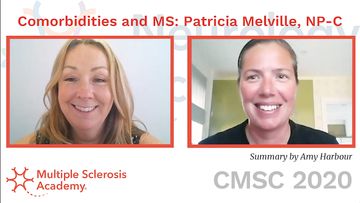A Clinician's Guide to Cognition in MS: Sarah Morrow, MD, MS, FRCPC, FAAN
Event reportsRuth Stross
Director of services, MS Trust
Aims of the session
The learning objectives for the session, explored across clear themes of cognition such as ‘learning and memory’, ‘information processing’, and ‘verbal fluency’, were:
- Discuss how cognitive impairment presents in persons with MS
- Recognise the impact of cognitive impairment on the lives of persons with MS
- Learn about possible treatment strategies that can be applied in clinic for cognitive impairment In MS
What is cognition?
The definition in the Webster dictionary Is “mental processes“, whilst the Oxford Dictionary describes it as “The faculty of knowing or perceiving things”.
Cognition is the processes involved in acquiring and understanding knowledge, memory and concentration. It is the use of our higher brain level functions: how we think, plan, remember and understand
The first research looking at cognition in MS was in 1991 (Rao, 1991).
- The community-based MS sample of 100 people with MS (using Poser criteria which was diagnosing patients later in life) with 39 patients having relapsing remitting MS, compared with a control sample of 100 people.
- The MS sample had an average of:
- 9 years since diagnosis
- 14.2 yrs since symptom onset,
- 13.2 yrs of education.
- 43% found to demonstrate cognitive impairment
Other studies noted found the prevalence of cognitive impairment to be as high as 65%.
How does cognitive impairment present in MS?
Cognitive impairment is common In MS across visual and verbal memory and occasionally executive function (table 1).
Table 1: Element of cognition and the way that impairment of this may present in a person with MS
| Element of cognition | Impaired presentation in person with MS |
|---|---|
| Verbal and visual memory | Episodes of forgetfulness |
| Attention | Tendency to be easily distracted |
| Information processing speed | Problems performing tasks quickly Problems performing multiple tasks Shifting attention |
| Executive function (problem solving) | Difficulties in solving thought problems Rigidity in solving problems |
| Visuospatial dysfunction | Impaired visual perception, recognition and construction, Difficulty completing tasks requiring hand-eye coordination |
Components of memory
Figure 1: Cognition: components of memory

Learning and memory:
- MS patients have more trouble with learning (the acquisition of information) than the retrieving a memory
- Most frequent complaint
- Easiest to recognise in day to day life
- Subjective complaints
Information processing speed and selective attention
- Processing speed difficulties include a decrease in speed of processing new information, most frequent impairment on formal testing, decreased productivity, slow response to information provided, difficulty multitasking.
- Processing speed
- Decrease in speed of processing new information
- Most frequent impairment on formal testing
- “I can do everything I used to do, I just need more time” (unable to do it as quickly or efficiently)
Attention
- Selectively focusing on one discrete aspect of information while ignoring other information
- Difficulty screening out distractions
- Difficulty with divided attention
Interplay between all 3
- Difficulty processing information leads to an inability to learn new information (memory)
- Both impaired processing speed and poor attention/ concentration lead to less mental flexibility
- Shifting between tasks or different conversations
- Dealing with interruptions (such as a phone call or knock at the door)
Verbal Fluency
- MS does not affect language (no aphasias or agnosias)
- But people with MS can have difficulty with “word retrieval” (infrequently affected)
- Often this subjective complaint is due to impaired processing speed
How does cognitive impairment present in MS?
Patients have often picked up tricks and compensatory techniques before they are initially seen by the neurologist, making it harder to detect.
- Tends to come on slowly
- Sometimes hard to notice it
- Often blamed on other things
- Busy at work
- Busy with kids and activities
- Often use tricks to help compensate without even realising it
- New research shows it can be involved in relapses
Cognitive impairment is frequently present at diagnosis, so because of this, all newly diagnosed patients receive baseline cognitive testing in the Canada MS clinic.
Assessments available include:
- Symbol Digits Modalities Test (SDMT)
- Paced Auditory Serial Addition Test (PASAT)
- California Verbal Learning Test (CVLT-111): Immediate recall and CVLT-1: Delayed recall
- Brief Visuospatial Memory Test - revised (BVMT-R): immediate recall, and delayed recall
- Delis Kaplin Executive Function System (D-KEFS) Sorting test
- Controlled Oral Word Association Test (COWAT)
- Judgement of Line Orientation (JLO)
Cognitive dysfunction has a weak correlation with physical disability, shown in this study
- ‘Benign’ MS Little of no physical disability after 15 years with MS (old term used)
- In a study, ⅓ of patients had cognitive impairment. (Cognitive assessment and quantitative MR metrics can help to identify benign MS, Amato et al, Neurology 2008).
Prevalence of cognitive impairment by clinical subtype (Ruano et al, 2017)
- Clinically isolated syndrome (CIS) 35%
- Relapsing-remitting MS 45%
- Secondary progressive MS 79%
- Primary progressive MS 91%
- All patients 46%
Frequency of cognitive impairment dramatically increases during the first 5 years of MS (Reuter et al JNNP 2011):
- One third impaired at baseline
- By 5 years that increased to 50% so 1 in 2 people with MS will have some cognitive impairment
Relevance of cognitive deterioration in early RRMS: a 3 years study. (Amato, 2010)
- No-one showed improvement overtime
- 45 people with MS (pwMS) followed over 10 years
- Poser criteria but still early disease at onset (mean time since diagnosis 1.5years)
- Initially 74 % cognitively normal
- Decrease to 51% at 4years and 44% at 10 years
So – why do we care about cognitive impairment in MS?
The impact of cognitive impairment:
- Cognitively impaired persons with MS report:
- Loss of self esteem
- Sexual dysfunction
- Impair family life and social relationships
- Higher rates of divorce
- Participate in fewer social activities ( worried they may not be able to contribute)
- Have significantly more car accidents than cognitively intact persons with MS or healthy controls (inability to be fit to drive)
- Car may be needed to maintain employment
- Loss of independence, restricted mobility
- A study by Morrow found significant cognitive decline in people with MS immediately after leaving work (Morrow, 2010)
- Another study found a significant cognitive decline during and post relapse when comparing SDMT performance in a prospective study for patients on Natalizumab with no relapses, and those with no treatment and who relapsed (Morrow, 2011)
Why follow-up is necessary:
Cognitive impairment in PwMS is progressive, and change over time is most pronounced in patients unimpaired at baseline
- Decline from baseline may not always result in impairment as per standardized tests
- But may still be detected by the patient and subsequently impact on their daily function
When should you screen for cognitive impairment, clinically?
Baseline cognitive function should be measured in order to both quantify function at that time, and to serve as a baseline for future comparison.
- In people with MS who are considered stable, cognition should be reassessed every 2-3 years
- Cognition should be assessed at the time of other meaningful changes (such as during a potential relapse or changes noted in the workplace).
- As a recommendation, cognitive testing such as BICAMS or SDMT, which takes just five minutes, should be used to screen for cognitive impairment as well as for changes in cognition over time.
- The author recommends that this form of testing be incorporated into MS nurse/practitioner annual assessments with the recommendation to repeat every 2-3years or post a relapse.
Conclusion
The take home message of this session was that cognitive impairment in MS is progressive, can hugely affect a person with MS, and should be assessed and supported wherever possible.
Key points to remember are:
- MS cognitive clinics in Canada run by MS neurologist from diagnosis onwards with regular repeat assessments every 2-3 years or post relapse.
- Patients have often picked up tricks and compensatory techniques before they are initially seen by the neurologist
- Should we incorporate SDMT into MS nurse/practitioner annual assessments with the recommendation to repeat every 2-3years or post a relapse
- Cognitive impairment in PwMS is progressive
- PwMS do not show improvement in cognitive impairment overtime
- Change over time is most pronounced in patients unimpaired at baseline
- Some studies found the prevalence of cognitive impairment in PwMS to be as high as 65%
References
- Rao SM, Leo GJ, Bernardin L, Unverzagt F. Cognitive dysfunction in multiple sclerosis. I. Frequency, patterns, and prediction. Neurology. 1991;41(5):685-691. doi:10.1212/wnl.41.5.685
- Thompson AJ, Banwell BL, Barkhof F, et al. Diagnosis of multiple sclerosis: 2017 revisions of the McDonald criteria. Lancet Neurol. 2018;17(2):162-173. doi:10.1016/S1474-4422(17)30470-2
- Amato MP, Portaccio E, Goretti B, et al. Relevance of cognitive deterioration in early relapsing-remitting MS: a 3-year follow-up study. Mult Scler. 2010;16(12):1474-1482. doi:10.1177/1352458510380089
- Morrow SA, Drake A, Zivadinov R, Munschauer F, Weinstock-Guttman B, Benedict RHB,; ‘Predicting loss of employment over three years in multiple sclerosis: clinically meaningful cognitive decline’, The Clinical Neuropsychologist; Vol 24, 2010, is 7; pps 1131-1145; Published online: 08 Sep 2010; doi.org/10.1080/13854046.2010.511272
- Morrow SA, Jurgensen S, Forrestal F, Munchauer FE, Benedict RH. Effects of acute relapses on neuropsychological status in multiple sclerosis patients [published correction appears in J Neurol. 2011 Sep;258(9):1609]. J Neurol. 2011;258(9):1603-1608. doi:10.1007/s00415-011-5975-3
The full CMSC session is available to watch here via NeurologyLive.
This activity has been sponsored by Roche Products Limited. Roche Products Limited has had no control over the educational content of this activity.

Related articles
Encouraging excellence, developing leaders, inspiring change
MS Academy was established in 2016 and in that time has accomplished a huge amount with exciting feedback demonstrating delegates feel inspired and energised along their personal and service development journeys. The various different levels of specialist MS training we offer are dedicated to case-based learning and practical application of cutting edge research.


